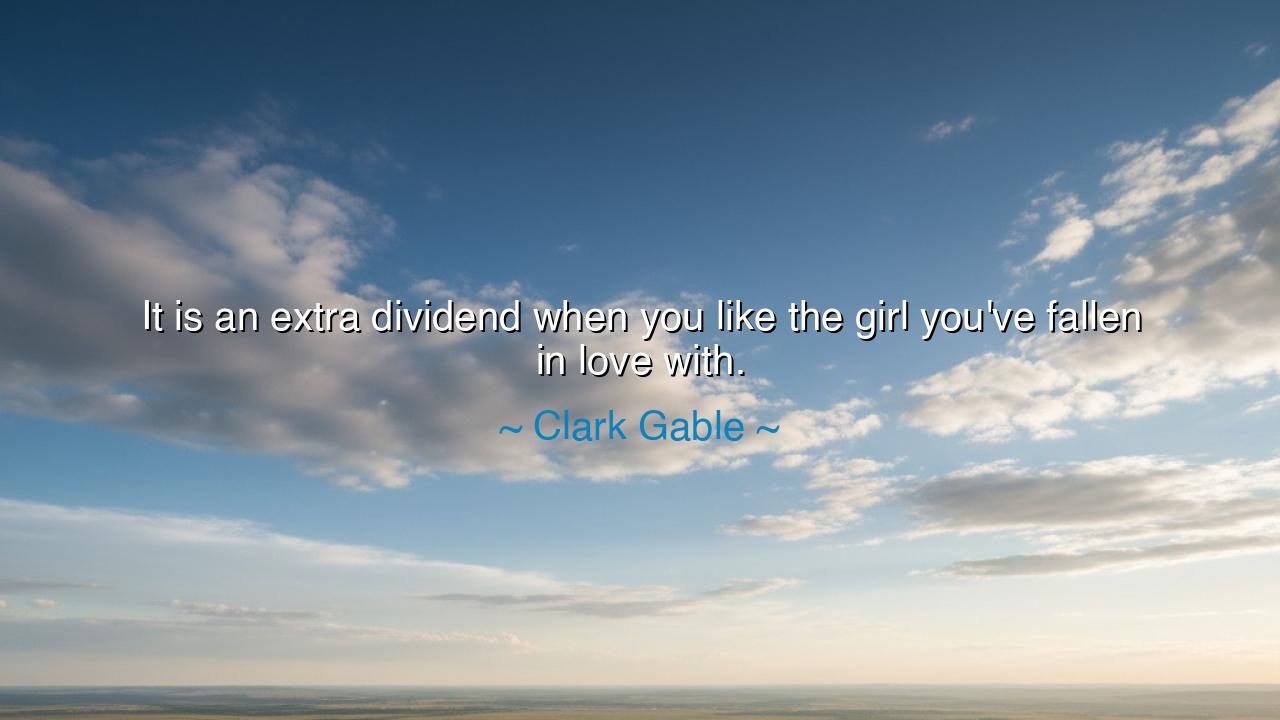
It is an extra dividend when you like the girl you've fallen in






In the words of Clark Gable, the silver idol of Hollywood’s golden age, we hear a truth both playful and profound: “It is an extra dividend when you like the girl you’ve fallen in love with.” Beneath the charm of his delivery lies a wisdom as old as the human heart — that love alone is not enough unless it is bound by friendship, that passion without respect is a fire that burns quickly and leaves only ashes. Gable, who lived beneath the blinding light of fame, understood what many learn too late: that to love is a gift, but to like the one you love is a miracle.
In his words, the phrase “extra dividend” is the voice of one who has lived through both enchantment and disillusion. Love, in its early fever, is often blind — drawn by beauty, mystery, or desire. It consumes like a flame, demanding nothing but the thrill of its own existence. But liking — true, enduring liking — belongs to the quieter realm of the soul. It is the calm that remains when the fire has cooled. To like someone is to delight not merely in their face or form, but in their laughter, their flaws, their way of being. It is to enjoy their presence even when the music stops. Gable’s words remind us that the rarest happiness is when these two forces — love and friendship — meet and walk side by side.
The origin of this truth is as old as the first lovers. In every age, the poets and philosophers have drawn the same distinction. The ancients spoke of many kinds of love: eros, the passion that inflames; philia, the friendship that steadies; and agape, the selfless devotion that endures. What Gable calls an “extra dividend” is the sacred union of eros and philia — the moment when the heart’s desire also becomes the mind’s companion. For to love without liking is to chase a shadow, but to like and love together is to dwell in sunlight.
Consider the story of Marcus Aurelius, the philosopher-king of Rome, and his wife Faustina. History tells us that their marriage was marked not only by devotion but by genuine fondness — a rare harmony in an age of political unions and arranged affections. In his private meditations, Marcus spoke of her patience, her warmth, her shared humor. He did not only love her; he liked her. And when she died, his grief was not only for the loss of a queen, but for the loss of a companion who had known his truest self. Through their example, we see that affection rooted in friendship endures even when the fires of youth have cooled.
Clark Gable himself, though a man known for his rugged independence and legendary romances, revealed in this simple quote the heart of one who had known both loneliness and longing. For despite fame, admiration, and beauty, he discovered that the truest bond between two people is not the thrill of possession but the peace of companionship. His life, like many of his era, was gilded with passion yet shadowed by tragedy — and so his words carry the quiet wisdom of experience: that love may ignite the soul, but liking keeps it alive.
There is humility in his statement, too — the recognition that liking the one you love is not guaranteed. Many love fiercely but cannot abide the one they love for long. Many adore beauty but cannot endure its silence. Gable’s “extra dividend” is a reminder that happiness is compounded when affection and admiration walk hand in hand. When laughter comes easily, when conversation flows, when respect deepens rather than wanes — that is when love matures into joy.
The lesson, then, is both gentle and profound: seek not only the one who sets your heart aflame, but the one whose presence brings you peace. Love that is rooted in friendship will outlast the storms of desire and the fading of youth. In practical life, this means looking beyond the dazzle of attraction to the deeper connection of spirit. Find someone whose soul you can walk beside, whose laughter you can share, whose silence you can bear. For beauty may draw you close, but friendship will keep you there.
So remember the quiet wisdom of Clark Gable, the man who stood as both lover and philosopher in his simplicity. To fall in love is human, to fall in friendship is divine — and when the two unite, life grants its sweetest reward. Treasure not only those who set your heart racing, but those who make your heart rest. For in the end, love is not the fire that burns, but the hearth that warms — and to like the one you love is the truest blessing beneath the sun.






AAdministratorAdministrator
Welcome, honored guests. Please leave a comment, we will respond soon